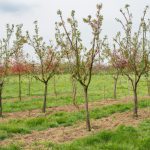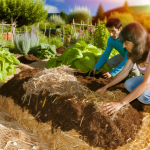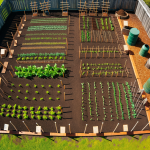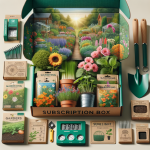Are you curious about the world of farming vs gardening? Do you find yourself wondering about the differences between farming vs gardening? Look no further, as we delve into the fascinating realm of cultivation and explore the nuances between these two practices. While both farming vs gardening involve cultivating plants, there are distinct differences that set them apart. Farming is a large-scale, commercial endeavor aimed at producing crops or raising livestock for economic gain. It requires extensive knowledge, planning, and specialized equipment to maximize productivity. On the other hand, gardening is often a more personal and recreational activity, typically practiced on a smaller scale. It allows individuals to cultivate plants for their own consumption or enjoyment, offering a therapeutic escape from the hustle and bustle of daily life. Join us on this journey as we dig deeper into the world of farming and gardening, unraveling the intricacies and discovering the joy of cultivating nature’s bounty.
Farming: Definition, practices, and objectives
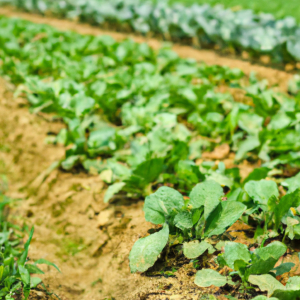
Farming is a complex and multifaceted practice that involves the cultivation of land for the purpose of producing crops or raising livestock. It is a large-scale operation that requires significant resources, including land, labor, and capital. The primary objective of farming is to generate a profit by selling the products of the land, whether it be crops, meat, dairy, or other agricultural commodities. Farmers employ various techniques such as crop rotation, irrigation, and the use of fertilizers and pesticides to maximize yields and ensure the health of their crops or livestock. Additionally, modern farming practices often involve the use of machinery and technology to streamline operations and increase efficiency. These advancements have revolutionized the agricultural industry, allowing farmers to produce larger quantities of food and meet the demands of a growing population.
Farming has a long and storied history, dating back thousands of years. It has evolved significantly over time, with advancements in irrigation, machinery, and crop breeding techniques driving increased productivity. The transition from subsistence farming to commercial farming has had a profound impact on society, enabling the growth of cities and the development of civilizations. However, farming is not without its challenges. It is highly dependent on factors such as weather conditions, pests, and disease, which can significantly impact yields and profitability. Additionally, the environmental impact of modern farming practices, including the use of chemical fertilizers and pesticides, has raised concerns about sustainability and the long-term health of our planet.
Gardening: Definition, practices, and objectives
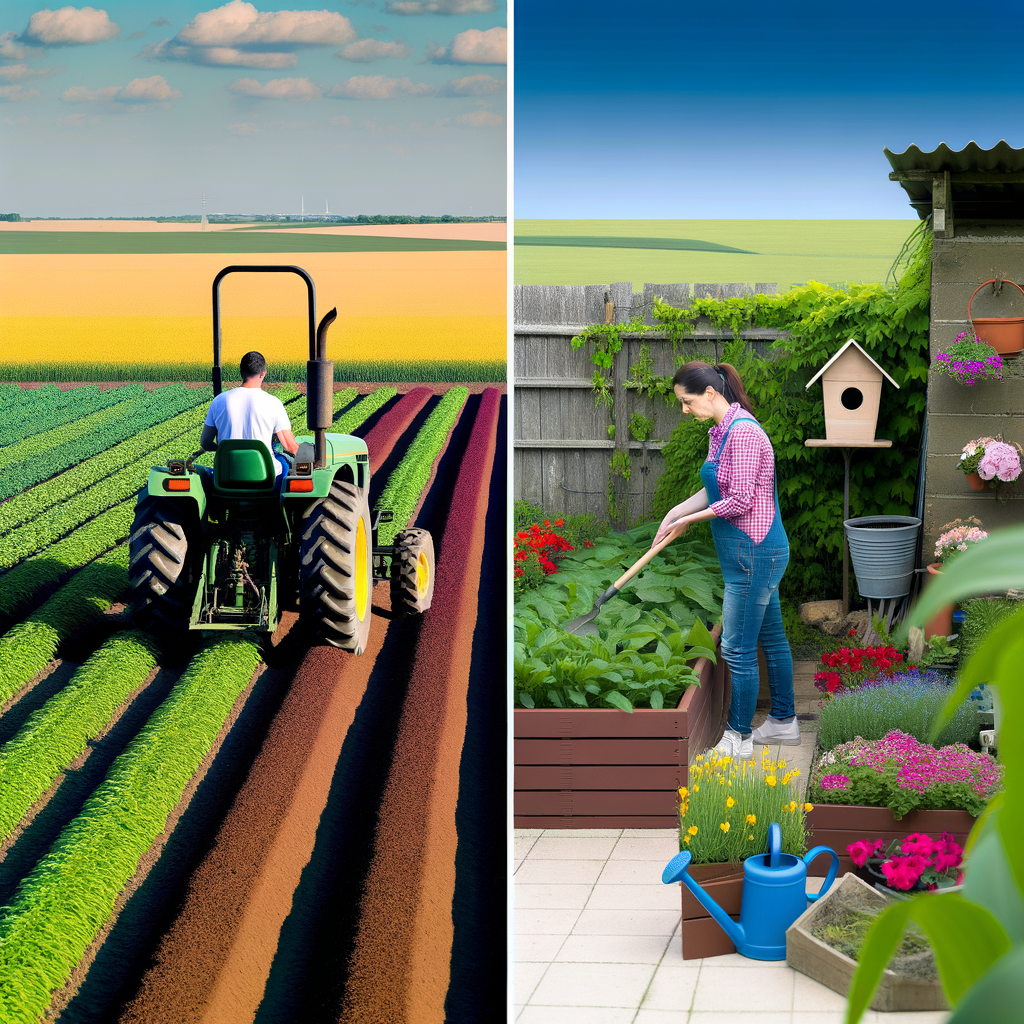
Gardening, in contrast to farming, is a more personal and intimate endeavor. It is often practiced on a smaller scale, typically in one’s own backyard or a community garden. The primary objective of gardening is not necessarily economic gain, but rather personal satisfaction, self-sufficiency, and the enjoyment of nature. Gardeners cultivate plants for various purposes, including growing their own food, beautifying their surroundings, and creating a peaceful and therapeutic space. Gardening allows individuals to connect with nature, observe the growth and development of plants, and reap the rewards of their labor.
Gardening has a rich history that dates back centuries. It was originally practiced by ancient civilizations as a means of survival, providing them with a reliable source of food. Over time, gardening evolved from a necessity to a leisure activity, with individuals cultivating plants for their beauty and aesthetic appeal. Today, gardening has become a popular hobby, with people of all ages and backgrounds embracing the joy and fulfillment it brings. From tending to a vegetable patch to creating a stunning flower garden, gardening offers a myriad of possibilities for self-expression and creativity.
Historical background and evolution of farming vs gardening
The history of farming can be traced back to the Neolithic Revolution, a period of human history when hunter-gatherer societies transitioned to settled agricultural communities. This shift was driven by the discovery of agriculture, which allowed humans to cultivate plants and domesticate animals for food production. The development of farming techniques, such as irrigation and crop rotation, enabled early civilizations to produce surplus food, leading to the growth of permanent settlements and the emergence of complex societies. As time progressed, farming practices continued to evolve, with advancements in technology and scientific knowledge driving increased productivity and efficiency.
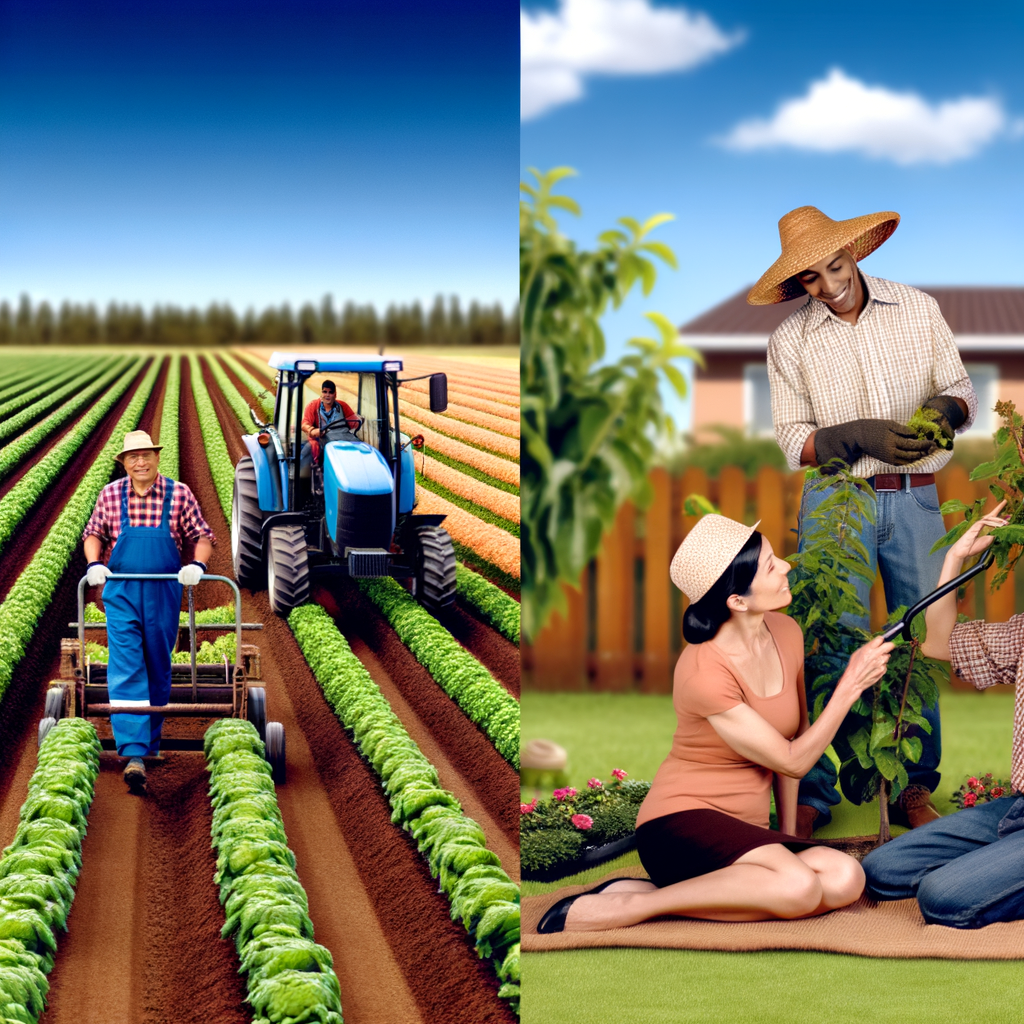
The Industrial Revolution marked a significant turning point in the history of farming. The introduction of machinery, such as the steam engine and mechanized farm equipment, revolutionized agricultural practices, enabling farmers to cultivate larger areas of land and increase crop yields. This period also saw the development of new farming methods, including the use of chemical fertilizers and pesticides, which further boosted productivity. However, these advancements also brought about environmental concerns, as the widespread use of chemicals had adverse effects on soil health and water quality. In recent years, there has been a growing interest in sustainable farming practices, with many farmers adopting organic farming methods and focusing on environmental stewardship.
Historical background and evolution of farming vs gardening
Gardening has a long and fascinating history, with evidence of its practice dating back to ancient civilizations such as the Egyptians, Greeks, and Romans. In these early societies, gardens were highly valued and meticulously maintained, serving as symbols of wealth and power. The concept of the garden evolved over time, with different cultures and time periods influencing its design and purpose. From the formal gardens of Renaissance Europe to the Zen gardens of Japan, each style of gardening reflects the unique aesthetics and values of its time and place.
During the Victorian era, gardening became a popular pastime among the upper classes, with grand estates and country houses boasting elaborate and meticulously landscaped gardens. The introduction of new plant species from around the world fueled the passion for gardening, as enthusiasts sought to cultivate exotic and rare plants. As societies became more urbanized, gardening took on a new significance, providing city dwellers with a connection to nature and an escape from the concrete jungle. Community gardens and allotments became increasingly popular, allowing individuals without access to land to indulge in their love for gardening.
Similarities between farming vs gardening
While farming vs gardening have distinct differences, there are also several similarities that bind them together. Both practices involve the cultivation of plants and require a basic understanding of horticulture. Whether it’s growing crops or tending to flowers, farmers and gardeners share a passion for nurturing plants and watching them flourish. Both farming and gardening also require careful planning and attention to detail. From selecting the right plants and preparing the soil to providing adequate water and nutrients, successful cultivation requires thoughtful consideration and a proactive approach.
Another similarity between farming vs gardening is the dependence on environmental factors. Both practices are influenced by climate, weather conditions, and natural resources. Farmers and gardeners must adapt to changing conditions and make adjustments to their practices accordingly. Additionally, both farming and gardening can be physically demanding, requiring manual labor and a certain level of fitness. Whether it’s plowing a field or digging a hole for a new plant, both activities provide a workout for the body and a sense of accomplishment.
Differences in scale and production Farming vs Gardening
One of the primary differences between farming vs gardening lies in the scale of operation and the level of production. Farming is a large-scale endeavor that involves the cultivation of vast areas of land and the production of crops or livestock on a commercial scale. Farmers often specialize in specific types of agriculture, such as grain farming, livestock production, or horticulture. Their goal is to maximize productivity and generate a profit by selling their products in the market. This requires a significant investment of resources, including land, machinery, and labor.
On the other hand, gardening is typically practiced on a smaller scale, often in one’s own backyard or a community garden. It is a more personal and recreational activity, focused on cultivating plants for personal consumption or enjoyment. Gardeners may grow a variety of plants, including vegetables, herbs, flowers, and ornamental plants. While gardening can be productive in terms of providing fresh produce or beautiful blooms, it is not typically done for commercial purposes. The scale of gardening allows for greater flexibility and experimentation, as individuals have the freedom to choose what to grow and how to care for their plants.
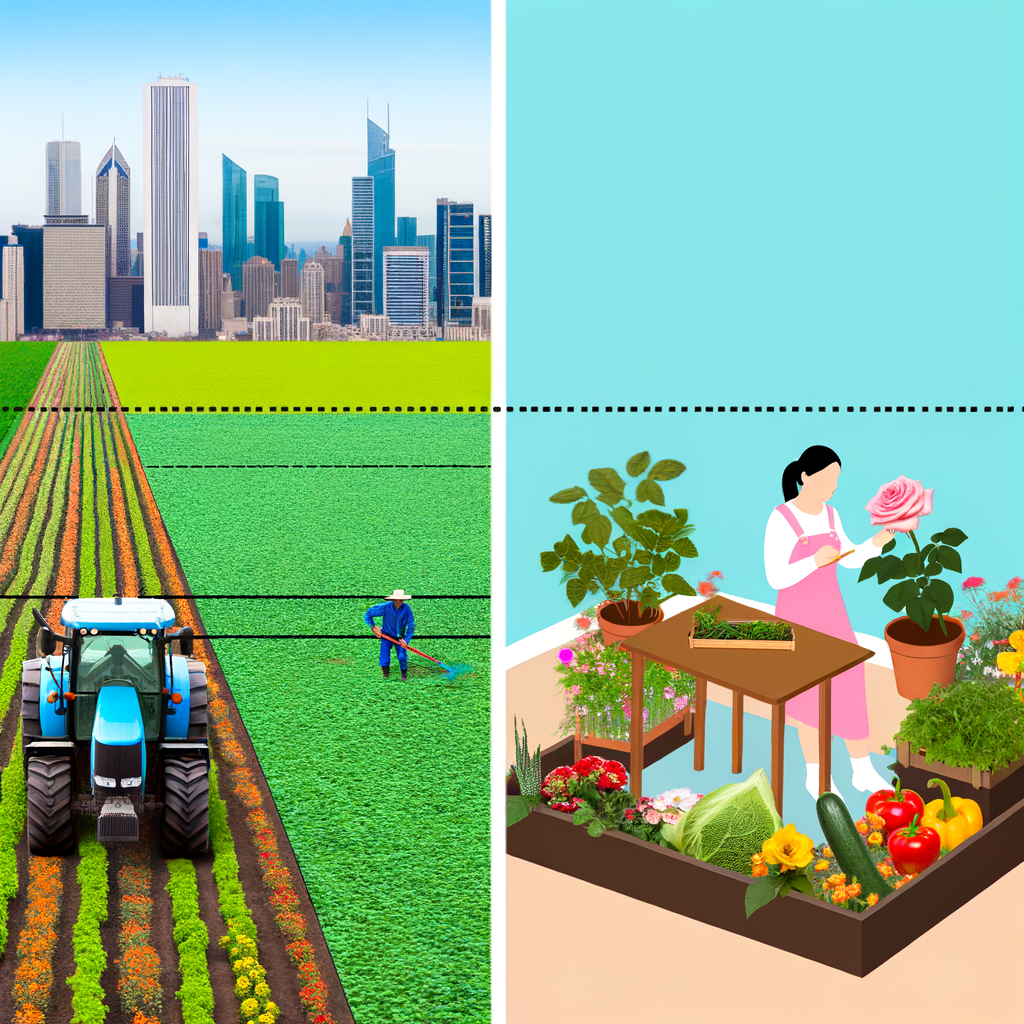
Differences in techniques and tools
Farming vs gardening also differ in terms of the techniques and tools used. Farming, being a large-scale operation, relies heavily on machinery to streamline operations and increase efficiency. Tractors, combine harvesters, and irrigation systems are just a few examples of the specialized equipment used in farming. Farmers also utilize advanced techniques such as precision agriculture, which involves the use of GPS and other technologies to optimize resource usage and maximize yields. Additionally, farmers often employ chemical fertilizers and pesticides to control pests and enhance crop growth.
In contrast, gardening typically involves manual labor and the use of basic tools such as shovels, rakes, and pruning shears. Gardeners rely on their knowledge and experience to tend to their plants, using organic fertilizers and natural pest control methods. While some gardeners may choose to use certain tools or equipment to make their tasks easier, the scale of gardening allows for a more hands-on and intimate approach. Gardeners often develop a close relationship with their plants, observing their needs and making adjustments accordingly.
Environmental impact of farming vs gardening
The environmental impact of farming vs gardening differs significantly due to the scale of operation and the techniques employed. Farming, particularly industrialized farming, has raised concerns about its impact on the environment. The use of chemical fertilizers and pesticides can contaminate soil and water, leading to ecosystem disruption and the loss of biodiversity. Additionally, large-scale farming practices often result in deforestation and habitat destruction to make way for agricultural land. The excessive use of water for irrigation can also strain water resources, particularly in regions with limited rainfall.
Gardening, on the other hand, has the potential to have a positive impact on the environment. Organic gardening practices, such as composting, mulching, and natural pest control, help promote soil health and reduce the need for chemical inputs. Additionally, gardens provide habitat and food sources for beneficial insects, birds, and other wildlife, contributing to biodiversity conservation. Gardens can also play a role in mitigating climate change by sequestering carbon dioxide and reducing the heat island effect in urban areas. By creating green spaces and planting trees, gardeners can contribute to the overall health and well-being of their communities.
Personal fulfillment and satisfaction in farming and gardening
While both farming vs gardening offer theior unique rewards, there is often a deeper personal fulfillment and satisfaction associated with each practice. For farmers, the ability to feed and sustain a growing population can be highly rewarding. The challenges and triumphs of cultivating the land and reaping the rewards of a successful harvest can bring a sense of accomplishment and pride. Farmers also play a vital role in their communities, providing jobs and contributing to the local economy. However, the demands of farming can be physically and mentally draining, requiring resilience and dedication.
Gardening, on the other hand, offers a more personal and intimate connection with nature. The act of planting a seed, nurturing it, and watching it grow into a thriving plant can bring a profound sense of joy and fulfillment. Gardening provides an escape from the stresses of daily life, allowing individuals to immerse themselves in the beauty and tranquility of their gardens. It offers an opportunity for self-expression and creativity, as gardeners can experiment with different plant combinations and design elements. Gardening also provides a sense of self-sufficiency, as individuals can grow their own food and reduce their reliance on store-bought produce.
Choosing between farming vs gardening
In conclusion, farming vs gardening are both noble pursuits that involve the cultivation of plants, yet they differ in scale, objectives, techniques, and environmental impact. Farming is a large-scale, commercial endeavor aimed at producing crops or raising livestock for economic gain, while gardening is often a more personal and recreational activity practiced on a smaller scale. Both practices have a rich history and continue to play important roles in society. Whether one chooses to pursue farming or gardening, it is important to recognize the unique challenges and rewards that each offers. Ultimately, the choice between farming and gardening depends on one’s interests, resources, and objectives. Regardless of the path chosen, both farming and gardening have the power to enrich our lives and connect us with the wonders of nature. Check out our blog,

